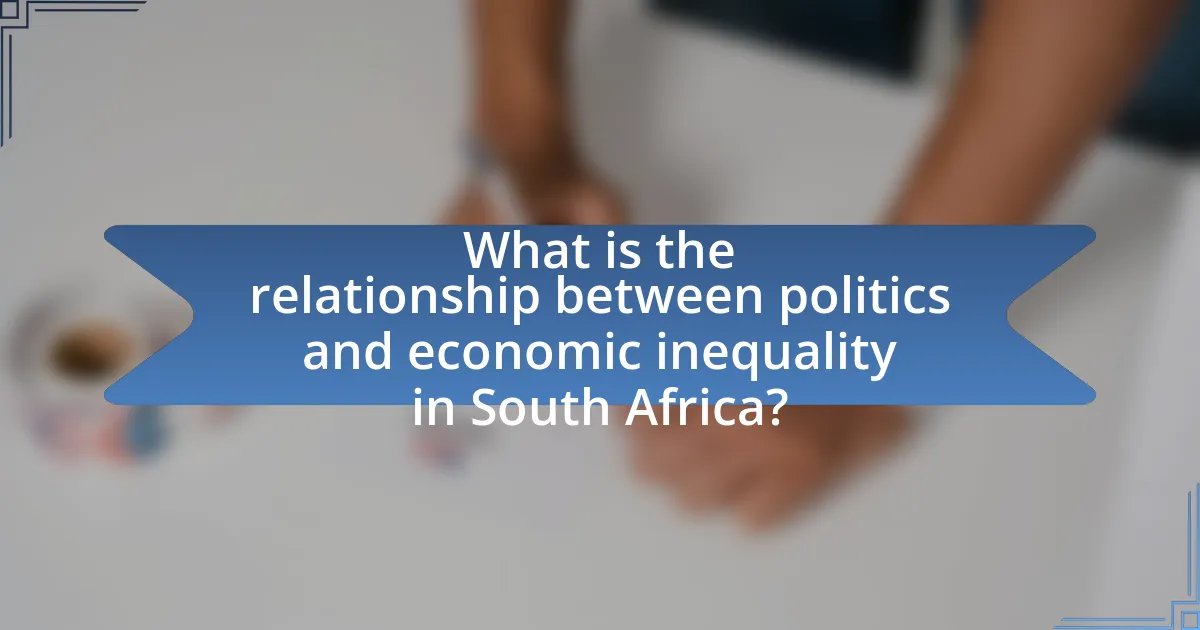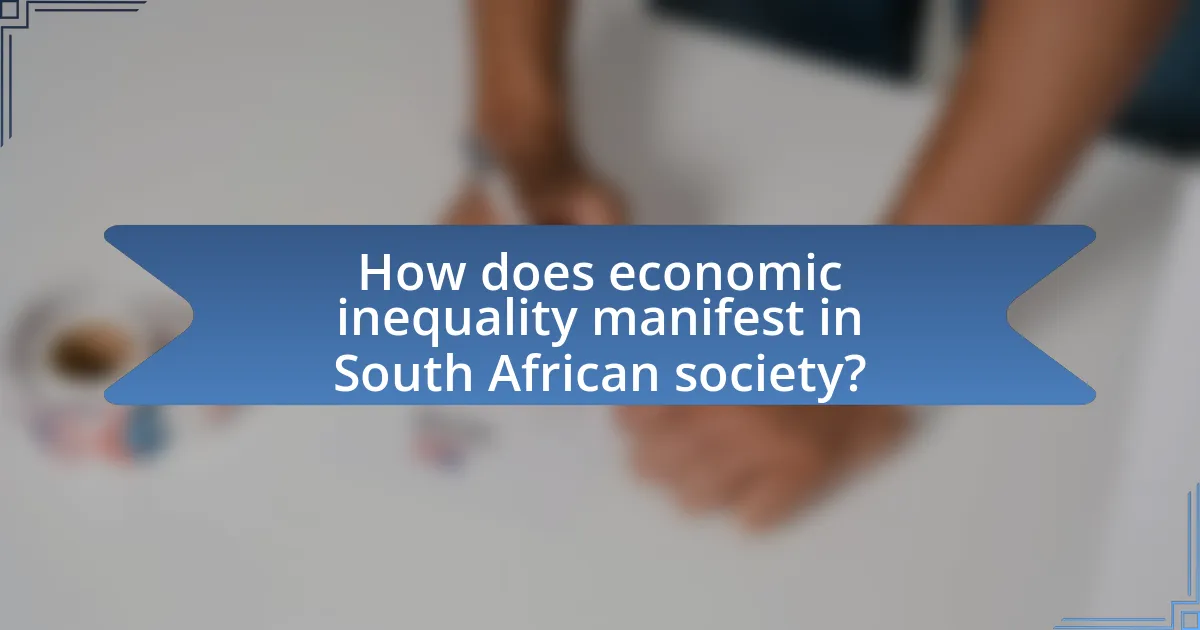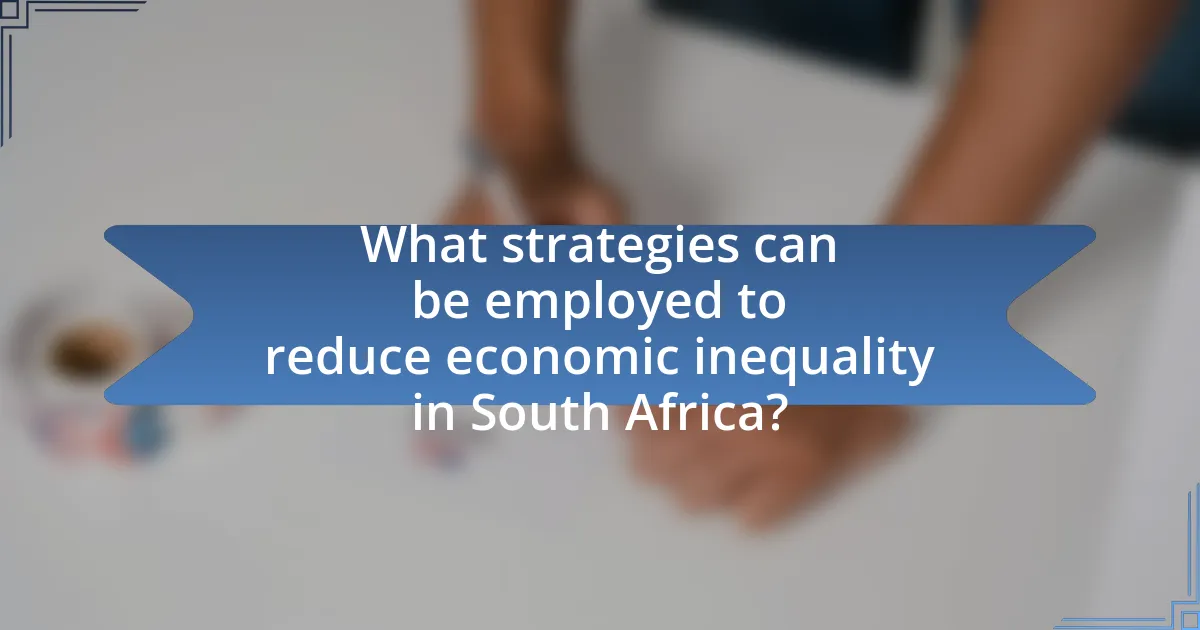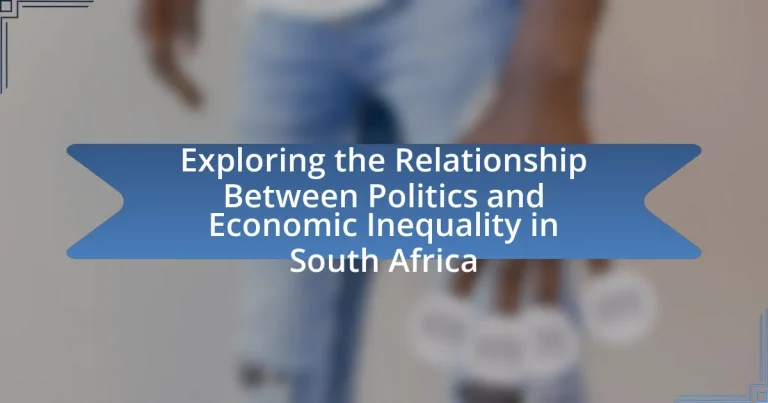The article examines the intricate relationship between politics and economic inequality in South Africa, highlighting how historical policies, particularly during apartheid, have led to persistent disparities in wealth and opportunity. It discusses the impact of political decisions on economic inequality, including land reform, education, and social welfare policies, and analyzes the effectiveness of various government initiatives aimed at addressing these issues. Additionally, the article explores the differing approaches of political parties towards economic inequality, the role of civil society, and the social consequences of economic disparities, ultimately emphasizing the need for comprehensive strategies to foster economic equity in the nation.

What is the relationship between politics and economic inequality in South Africa?
The relationship between politics and economic inequality in South Africa is characterized by systemic policies that have historically favored certain demographics, leading to significant disparities in wealth and opportunity. The apartheid regime, which lasted until the early 1990s, enforced racial segregation and economic exclusion, creating a legacy of inequality that persists today. According to the World Bank, South Africa is one of the most unequal countries globally, with a Gini coefficient of 0.63 as of 2021, indicating a high level of income inequality. Political decisions regarding land reform, education, and social welfare have further influenced economic disparities, often benefiting the affluent while marginalizing the poor. The ongoing challenges in governance and corruption also exacerbate these inequalities, as resources are not equitably distributed, hindering economic mobility for disadvantaged groups.
How do political decisions influence economic inequality in South Africa?
Political decisions significantly influence economic inequality in South Africa by shaping policies that affect wealth distribution, access to resources, and social services. For instance, the implementation of land reform policies aimed at redressing historical injustices has been slow and often contentious, leading to disparities in land ownership and agricultural productivity. According to the World Bank, South Africa remains one of the most unequal societies globally, with a Gini coefficient of 0.63 as of 2021, largely due to these political choices. Additionally, government spending priorities, such as investments in education and healthcare, directly impact economic opportunities for marginalized communities, further entrenching inequality.
What specific policies have been implemented to address economic inequality?
The South African government has implemented several specific policies to address economic inequality, including the Broad-Based Black Economic Empowerment (B-BBEE) Act, which aims to promote economic participation of black South Africans. Additionally, the Employment Equity Act seeks to eliminate unfair discrimination in the workplace and promote equal opportunities. The National Development Plan (NDP) outlines strategies for reducing poverty and inequality by 2030, focusing on job creation and education. Furthermore, social grants, such as the Child Support Grant, provide financial assistance to low-income families, directly impacting poverty levels. These policies are designed to create a more equitable economic landscape in South Africa.
How do political parties differ in their approaches to economic inequality?
Political parties in South Africa differ significantly in their approaches to economic inequality, primarily through their policy proposals and ideological frameworks. The African National Congress (ANC) emphasizes redistribution through social welfare programs and affirmative action to address historical injustices, aiming to uplift marginalized communities. In contrast, the Democratic Alliance (DA) advocates for economic growth through free-market policies, arguing that reducing barriers to business will create jobs and ultimately benefit all socioeconomic groups. The Economic Freedom Fighters (EFF) take a more radical stance, calling for land expropriation without compensation and nationalization of key industries to directly confront economic disparities. These differing approaches reflect their underlying philosophies regarding the role of the state in economic intervention and the mechanisms they believe will effectively reduce inequality.
What historical factors have shaped the current political and economic landscape?
The current political and economic landscape in South Africa has been shaped primarily by the legacy of apartheid, colonialism, and the transition to democracy. Apartheid, which enforced racial segregation and discrimination from 1948 until the early 1990s, created deep socio-economic divides that persist today, with significant disparities in wealth and access to resources along racial lines. The end of apartheid in 1994 marked a significant political shift, leading to the establishment of a democratic government; however, the economic policies implemented during this transition, such as the Growth, Employment and Redistribution (GEAR) strategy, have been criticized for failing to adequately address the structural inequalities inherited from apartheid. Additionally, land reform issues and the slow pace of economic transformation have further entrenched economic inequality, impacting the political stability and social cohesion of the nation. These historical factors collectively contribute to the ongoing challenges in achieving equitable economic growth and political representation in South Africa.
How did apartheid impact economic inequality in South Africa?
Apartheid significantly exacerbated economic inequality in South Africa by institutionalizing racial discrimination in access to resources, employment, and education. Under apartheid, the government enforced policies that privileged the white minority while systematically disenfranchising the black majority and other racial groups. For instance, the Group Areas Act of 1950 segregated residential areas, limiting black South Africans to underdeveloped regions with minimal economic opportunities. Additionally, the Bantu Education Act of 1953 ensured that black individuals received inferior education, perpetuating a cycle of poverty and limiting their ability to compete in the job market. As a result, by the end of apartheid in the early 1990s, the wealth gap between racial groups was stark, with white households earning significantly more than black households, illustrating the long-lasting impact of these policies on economic inequality.
What role did international sanctions play in shaping economic policies?
International sanctions significantly influenced economic policies by compelling governments to alter their strategies in response to external pressures. In South Africa, for instance, sanctions during the apartheid era led to economic isolation, prompting the government to reconsider its policies to attract foreign investment and improve international relations. The imposition of trade restrictions and financial sanctions in the 1980s resulted in a decline in economic growth and increased unemployment, which ultimately forced the South African government to negotiate an end to apartheid and implement reforms aimed at economic liberalization. This shift was evidenced by the transition to a democratic government in 1994, which prioritized policies that addressed economic inequality and aimed to integrate South Africa into the global economy.

How does economic inequality manifest in South African society?
Economic inequality in South African society manifests through significant disparities in income, wealth distribution, and access to essential services. The Gini coefficient, a measure of income inequality, indicates that South Africa has one of the highest levels of inequality globally, with a Gini coefficient of approximately 0.63 as of 2021. This inequality is evident in the stark contrast between affluent urban areas and impoverished townships, where many residents lack basic amenities such as clean water, electricity, and quality education. Furthermore, unemployment rates disproportionately affect marginalized communities, with youth unemployment reaching over 60% in some regions. These factors collectively illustrate how economic inequality is deeply entrenched in the socio-economic fabric of South Africa, perpetuating cycles of poverty and limiting social mobility.
What are the key indicators of economic inequality in South Africa?
The key indicators of economic inequality in South Africa include the Gini coefficient, income distribution, and unemployment rates. The Gini coefficient, which measures income inequality on a scale from 0 to 1, is notably high in South Africa, recorded at approximately 0.63 in 2021, indicating significant disparities in income. Income distribution data reveals that the wealthiest 10% of the population earns more than 50% of total income, while the bottom 50% earns only about 8% of total income. Additionally, the unemployment rate, which stood at around 34% in 2021, disproportionately affects lower-income groups, exacerbating economic inequality. These indicators collectively illustrate the severe economic disparities present in South Africa.
How do income disparities vary across different demographics?
Income disparities in South Africa vary significantly across different demographics, particularly along racial, gender, and geographic lines. For instance, data from the 2021 General Household Survey indicates that Black South Africans earn substantially less than their White counterparts, with the average income for Black individuals being approximately 30% lower than that of White individuals. Gender also plays a critical role, as women in South Africa earn about 27% less than men, highlighting a persistent gender wage gap. Additionally, urban areas tend to have higher income levels compared to rural regions, where economic opportunities are limited. These disparities are influenced by historical factors, such as apartheid policies, which have long-lasting effects on economic access and opportunities for different demographic groups.
What is the impact of economic inequality on access to education and healthcare?
Economic inequality significantly restricts access to education and healthcare in South Africa. Individuals from lower economic backgrounds often face barriers such as inadequate funding for schools and limited access to quality healthcare services. For instance, a report by the World Bank indicates that children from the poorest households are less likely to complete secondary education compared to their wealthier peers, with only 30% of students from the lowest income quintile completing high school. In healthcare, the unequal distribution of resources leads to disparities in health outcomes; the South African Health Review highlights that wealthier individuals have access to private healthcare, while poorer populations rely on underfunded public services, resulting in higher morbidity and mortality rates among disadvantaged groups.
What are the social consequences of economic inequality in South Africa?
Economic inequality in South Africa leads to significant social consequences, including increased crime rates, social unrest, and diminished social cohesion. The stark wealth gap fosters feelings of disenfranchisement among the economically disadvantaged, which can result in higher incidences of violent crime; for instance, South Africa has one of the highest murder rates globally, often attributed to socio-economic disparities. Additionally, economic inequality exacerbates tensions between different racial and socio-economic groups, contributing to social unrest, as seen in the protests and riots that have occurred in response to perceived injustices. Furthermore, the lack of access to quality education and healthcare for lower-income populations perpetuates cycles of poverty, hindering social mobility and reinforcing inequality. These factors collectively undermine social cohesion, leading to a fragmented society where trust and collaboration among communities are severely diminished.
How does economic inequality affect social cohesion and stability?
Economic inequality undermines social cohesion and stability by creating divisions among different socioeconomic groups. When wealth is concentrated in the hands of a few, it leads to feelings of resentment and alienation among those who are economically disadvantaged. Research indicates that high levels of economic inequality correlate with increased social unrest and crime rates, as marginalized groups may resort to protests or violence to express their frustrations. For instance, a study by the World Bank found that countries with greater income inequality experience more frequent social conflicts, which destabilizes communities and erodes trust in institutions. This lack of trust further exacerbates social fragmentation, making it difficult for societies to unite around common goals or values.
What are the implications for crime and safety in unequal societies?
Inequality in societies significantly increases crime rates and diminishes safety. Research indicates that higher levels of economic inequality correlate with increased violent crime, as marginalized groups may resort to crime out of desperation or lack of opportunities. For instance, a study by the World Bank found that countries with greater income disparity experience higher rates of homicide and property crimes. Additionally, unequal societies often face weakened social cohesion, leading to mistrust among community members, which further exacerbates crime and safety issues. In South Africa, the high levels of inequality have been linked to persistent crime challenges, as evidenced by crime statistics showing elevated rates of violent offenses in economically disadvantaged areas.

What strategies can be employed to reduce economic inequality in South Africa?
To reduce economic inequality in South Africa, strategies such as implementing progressive taxation, enhancing access to quality education, and promoting inclusive economic growth can be employed. Progressive taxation can redistribute wealth by taxing higher incomes at increased rates, which can fund social programs aimed at the disadvantaged. For instance, the South African Revenue Service reported that a more equitable tax system could significantly increase funding for public services. Enhancing access to quality education ensures that all individuals, regardless of their background, have the opportunity to improve their economic standing, as evidenced by studies showing that education correlates with higher income levels. Lastly, promoting inclusive economic growth through support for small and medium enterprises can create jobs and stimulate local economies, which is crucial in a country where unemployment rates are high, currently estimated at around 34%. These strategies, when effectively implemented, can contribute to a more equitable economic landscape in South Africa.
What role do government interventions play in addressing economic inequality?
Government interventions play a crucial role in addressing economic inequality by implementing policies that redistribute wealth and provide social services. These interventions include progressive taxation, social welfare programs, and public investments in education and healthcare, which aim to reduce disparities in income and access to resources. For instance, South Africa’s social grants system has lifted millions out of poverty, demonstrating the effectiveness of targeted financial support in narrowing the income gap. Additionally, policies promoting affirmative action and land reform seek to rectify historical injustices and empower marginalized communities, further contributing to a more equitable economic landscape.
How effective are social welfare programs in reducing inequality?
Social welfare programs are effective in reducing inequality, particularly in South Africa, where they play a crucial role in alleviating poverty and improving income distribution. For instance, the South African Social Security Agency reported that social grants lifted approximately 3 million people above the poverty line in 2020. Additionally, research by the World Bank indicates that social assistance programs significantly reduce income inequality, with the Gini coefficient decreasing by about 2.5 points due to these interventions. These programs provide essential support to vulnerable populations, thereby contributing to a more equitable society.
What are the challenges in implementing land reform policies?
The challenges in implementing land reform policies include political resistance, inadequate funding, and social tensions. Political resistance arises from vested interests in land ownership, often leading to delays and conflicts in policy execution. Inadequate funding hampers the ability to purchase land and support beneficiaries, limiting the effectiveness of reform initiatives. Social tensions can escalate due to historical grievances and competition for land, complicating the reform process. For instance, the South African government has faced significant pushback from landowners and political factions, which has stalled progress on land redistribution efforts.
How can civil society contribute to reducing economic inequality?
Civil society can contribute to reducing economic inequality by advocating for policy changes that promote equitable resource distribution and social justice. Organizations within civil society, such as non-profits and community groups, often engage in awareness campaigns that highlight the disparities in wealth and access to opportunities, thereby influencing public opinion and government action. For instance, the South African NGO sector has played a crucial role in pushing for reforms in land redistribution and access to education, which are essential for addressing systemic inequalities. Research indicates that countries with active civil societies tend to have lower levels of economic inequality, as these organizations hold governments accountable and push for inclusive economic policies.
What initiatives have been successful in promoting economic equity?
Successful initiatives in promoting economic equity in South Africa include the Broad-Based Black Economic Empowerment (B-BBEE) program and the Expanded Public Works Programme (EPWP). The B-BBEE program aims to increase the participation of black individuals in the economy through ownership, management, and skills development, contributing to a more equitable distribution of wealth. The EPWP provides temporary work opportunities and skills training to unemployed individuals, helping to alleviate poverty and improve livelihoods. According to the South African government, B-BBEE has led to a significant increase in black ownership of businesses, while the EPWP has created over 4 million work opportunities since its inception in 2004, demonstrating its impact on economic equity.
How can grassroots movements influence political change regarding inequality?
Grassroots movements can influence political change regarding inequality by mobilizing communities to advocate for policy reforms and raise awareness about social injustices. These movements often highlight the experiences of marginalized groups, thereby pressuring political leaders to address systemic inequalities. For instance, the Treatment Action Campaign in South Africa successfully fought for access to antiretroviral treatment for HIV/AIDS, demonstrating how grassroots activism can lead to significant health policy changes. Additionally, grassroots organizations can leverage social media to amplify their messages, engage a broader audience, and foster solidarity, which can result in increased political participation and accountability.
What best practices can be adopted to foster economic equality in South Africa?
To foster economic equality in South Africa, implementing progressive taxation, enhancing access to quality education, and promoting inclusive economic policies are essential best practices. Progressive taxation can redistribute wealth more equitably, as evidenced by the South African Revenue Service’s data showing that higher tax rates on the wealthy can fund social programs benefiting lower-income groups. Enhancing access to quality education ensures that all citizens have the skills necessary to participate in the economy, with studies indicating that education significantly correlates with income levels. Promoting inclusive economic policies, such as supporting small and medium enterprises, can create job opportunities and stimulate economic growth, as highlighted by the World Bank’s findings that SMEs contribute significantly to job creation in developing economies.


